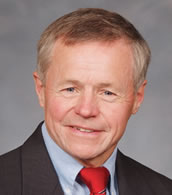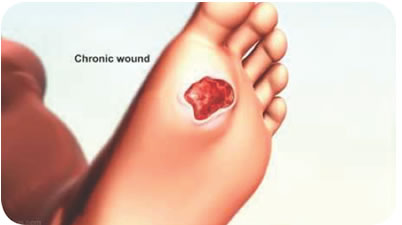|
Chronic Wounds and Treatment MethodsKirk V. Dahl, MD Chronic wounds are sores or open areas of the skin that are very slow to heal or do not heal at all. While the idea of a chronic wound may seem strange to you, it is an everyday reality and oftentimes is a painful and unpleasant part of life for the estimated 6.5 million Americans who have chronic wounds. Normally skin wounds heal fairly rapidly and without much help. Even large cuts, deep abrasions and surgical wounds usually heal with only a few days of discomfort and nothing more than simple bandages. However, some people have medical conditions or other factors related to their lifestyles which make healing difficult. The most common situation is when the skin becomes unhealthy. Among the most common causes are diabetes, swelling (edema) of the skin and underlying tissues, too much pressure on the skin, old scars, ongoing bumping or stretching of the wound and poor blood flow. Chronic wounds can develop following injuries to the skin, but they very often develop without any injury. One example is when there is too much swelling in the legs. Even without an injury, the swelling leads to too much tension on the skin, poor supply of oxygen and other nutrients to the area, thinning of the skin and eventually a breakdown of the skin and other tissues. Even an initially small wound can easily grow in size and can fail to heal for months or even years. Chronic wounds are a problem for several reasons. Often they are painful, and the pain can be worsened by simple activities such as walking or even sleeping in the wrong position. The pain can be enough to prevent people from working and enjoying other activities. Most chronic wounds are unsightly and may be a source of embarrassment or social rejection. Chronic wounds may create an unpleasant situation with drainage and odor. Also, an open wound is prone to infection, which in some cases can be difficult to cure and can even lead to amputation. The good news is that with proper care, well over 90 percent of chronic wounds can be healed. Some wounds, such as those due to poor blood flow, are usually more difficult to cure, but with proper management, the great majority of chronic wounds will heal satisfactorily. The key factor is understanding why the wound is not healing normally. In many cases, this is fairly easy for your doctor to identify. Sometimes additional testing is needed, such as a skin biopsy, MRI or blood tests.
As with most medical problems, patient compliance is very important. It is no fun to have to change your lifestyle because of your health, but persons with chronic wounds have to be part of the team and follow all the recommendations in order to successfully heal. Even with the best of care and the most careful of patients, wound healing can be slow. New skin grows in from the edges, and large wounds can take weeks or months to close over, even when everything goes well. Fortunately, as healing progresses, pain and other negative factors diminish and the rewards of full healing can begin to be enjoyed. When a motivated patient joins forces with a knowledgeable wound care team and advanced wound care options, chronic wounds can in most cases be successfully and often permanently cured.
Dr. Dahl, Medical Director – OakLeaf Advanced Wound Care |



 Treatment depends upon the cause of the wound. Cleaning out any non-living material and applying specialized wound dressings is the start. Control of infection, swelling and inflammation, and protection against additional injury to the site are critical. Often times management of other medical conditions helps. Good nutrition and attention to proper weight are important. Sometimes more advanced treatment options are used, including hyperbaric oxygen and so-called bio-engineered tissue made from human skin cells. Occasionally a surgical procedure will be recommended to speed the healing. An experienced wound care team can provide patients with many options.
Treatment depends upon the cause of the wound. Cleaning out any non-living material and applying specialized wound dressings is the start. Control of infection, swelling and inflammation, and protection against additional injury to the site are critical. Often times management of other medical conditions helps. Good nutrition and attention to proper weight are important. Sometimes more advanced treatment options are used, including hyperbaric oxygen and so-called bio-engineered tissue made from human skin cells. Occasionally a surgical procedure will be recommended to speed the healing. An experienced wound care team can provide patients with many options.